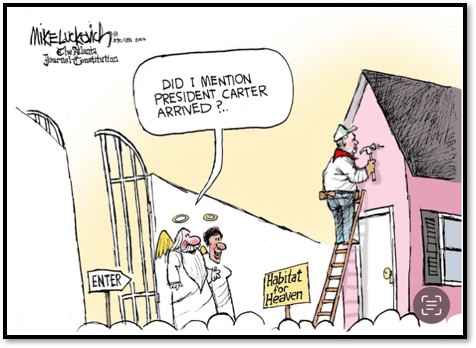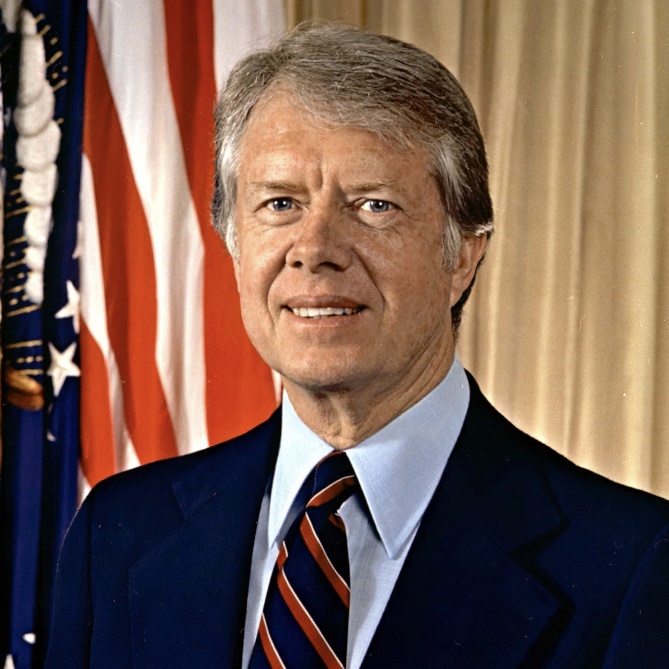
Former President Jimmy Carter died on December 29, 2024. He was 100.
Fifty years ago (December 7, 1974, to be precise), Mike White, Ken Hill and I hosted a political breakfast in Kansas City for Georgia Governor Jimmy Carter.
Why were we having breakfast with a future president two years before his election? And why would he take up much of my time for the next six years?
Serendipity. Here’s the story…
1974 – Jackson County: In early 1974, county legislator Mike White began his campaign for county executive. I was his campaign manager. Mike and I met weekly for a planning session with Ken Hill, a savvy politico and motivator. Mike won the August primary, and later that month, Ken Hill went out and locked up enough votes for me to be elected chair of the Jackson County Democratic Committee. This meant I would be working with the whole ticket, including Senator Tom Eagleton who was running for his second term. Below, a campaign flyer from the County Committee for the general election in November.
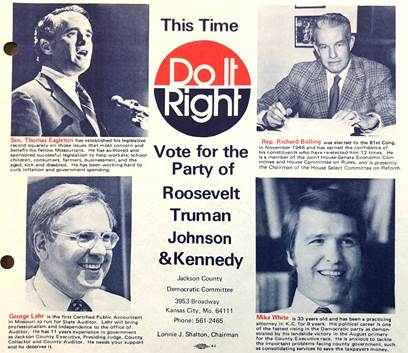
The Presidential Campaign (As of 1974): Although the presidential election was two years away, the field of Democrats running for President exploded. The prospect of running as a Democrat in the wake of Watergate was appealing. Many of those candidates made early stops in Kansas City, and two were the eventual running mates for 1976.
Walter Mondale in 1974: In October of 1974, the Jackson County Democratic Committee (with an assist from Senator Eagleton) brought in Minnesota Senator Walter Mondale to speak at a general election rally. At this stage, Mondale was making a test run for the presidency. After Mondale finished his speech, I remember thanking him and, in the high of the moment, telling the crowd that we just heard from the next President of the United States. Sounded good, and he had said he was 99% sure he would be running. The next day, we hosted a breakfast for Mondale to meet local Democratic politicos (like Rita and me below).
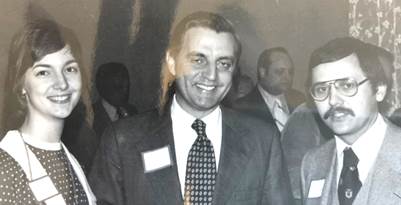
The next month, Mondale ended his presidential run, saying, “After more than a year of constant travel, constant fundraising, and constant speeches, I had pulled about even with ‘None of the Above’ in national opinion surveys, and I dropped that bid – to widespread applause.”
Jimmy Carter in 1974: In December of 1974, the Democratic National Committee held a Mid-Term Conference in Kansas City. Many of the potential presidential candidates attended. Mike White, Ken Hill and I hosted a series of events to introduce the candidates to local Democratic leaders. Below, the beginning of my letter to Carter:
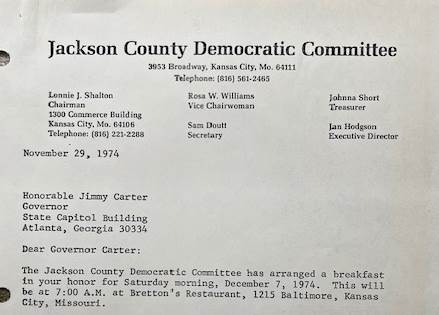
Mike remembers Carter to be the most intense of the candidates we met and that he finished his talk with “I don’t intend to lose.” After the breakfast, Mike told Ken and me we had just been sitting with the next President. At the time, Carter was polling at about 1%.
Below, Carter at the Mid-Term Convention. Five days after our breakfast, Carter formally announced his candidacy.
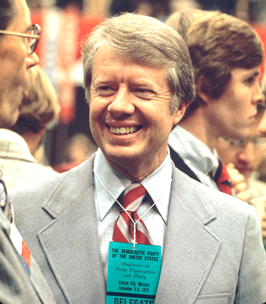
1975 – Setting the Stage: The cartoon below is a good depiction of the crowded Democratic field. Note the absence of Mondale who had dropped out.
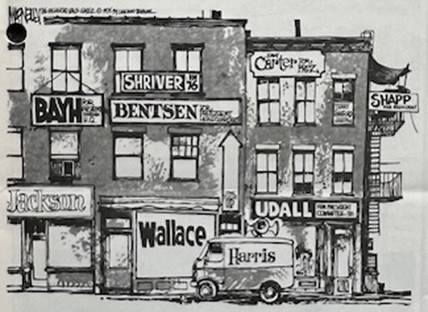
One of Carter’s key moves in 1975 was releasing his book Why Not the Best?. I still have my copy.
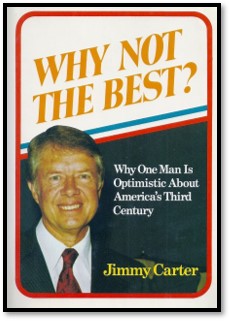
The book laid out Carter’s plans for the country, and it began with two basic questions. Can our government be honest, decent, open, fair and compassionate? Can our government be competent?
In the last chapter, with the benefit of his plans laid out in the book, he answered a resounding YES to both questions.
But Carter still had a long way to go with the electorate. In the first week of January of 1976, Gallup had Carter polling at 4%.
1976 – The Early Primaries (January 19 – April 10): More than any other candidate, Carter recognized the importance of creating momentum by winning the early primaries. He was an unknown, but he turned this into a benefit by running as an outsider. His plan paid off big in the first primary in Iowa. His 25.57% was twice as much as any other candidate. He continued to do well in the next 16 contests, but so did Mo Udall, George Wallace and Henry Jackson.
I’ll note one key endorsement he got in March. Joe Biden, a 33-year-old Senator from Delaware.
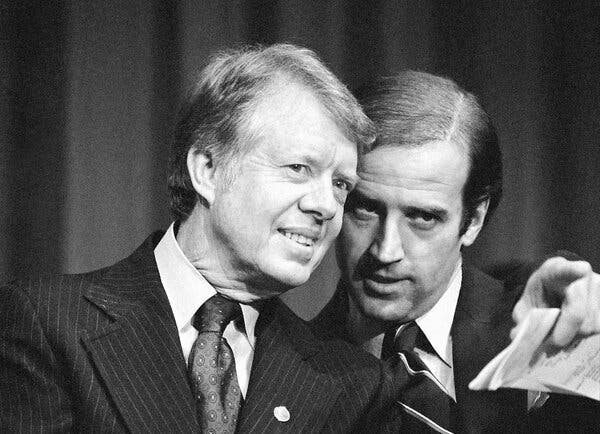
Missouri Ward/County Meetings (April 20/21): In Jackson County, Ken Hill became an early supporter of electing Carter delegates. Tom Eagleton and Mike White thought it was still too early for a final decision and supported an uncommitted delegation (remember Mike’s instinct in 1974 that we had just met the next President?).

I was neutral because as County Chair I was tasked with making the “call” for registered voters to attend the 32 ward meetings. This was the first step in the new (complicated) state committee three-tier selection process . Thank goodness I had the help of my committee’s Executive Director, Jan Hodgson.

The Missouri ward votes went strongly for uncommitted, and this carried over to the second tier at the county level: Carter – 30.13%; Uncommitted – 70.2%; and single digits for the other candidates.
On May 13, Eagleton, White and other Democratic leaders endorsed Carter, prompting most of the uncommitted Missouri delegates to go for Carter. By the time the convention was convened in July, Carter had enough votes for the nomination.
Then, a cool thing happened (from my perspective). Carter selected Senator Walter Mondale to be his VP running mate. I did not know it at the time, but this would change my life.

The General Election: Our Jackson County Democratic Committee quickly joined forces with the Carter campaign and worked out of an office at 201 E. Gregory.

I hired Woody Overton to run the County Committee headquarters, his first political staff position in what became a storied career in politics and government.
One of the Carter field organizers we worked with was Scott Burnett. After the election, Scott did a 4-year stint in the White House and then headed to Kansas City where he became a long-time activist, including serving 24 years on the Jackson County Legislature. He has remained close to the Carter family and will be in Washinton next week for the memorial services.
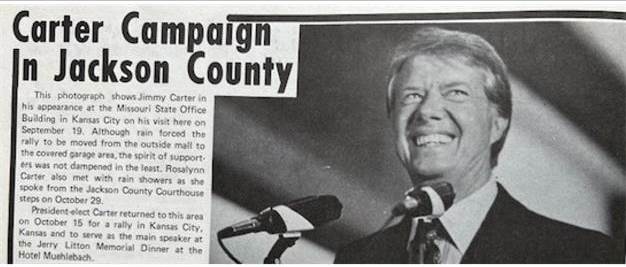
As for me in 1976, I joined up with the Carter/Mondale campaign advance team, the people who go in a few days before the candidate arrives to organize events, security and media. Serendipity indeed. In 1974, we had hosted Mondale (who dropped out) and Carter (who was at 1%). Two years later, we were in the middle of their campaign for the White House. I still had my day job as a lawyer, but as a part-time volunteer, I advanced campaign stops for Mondale in several states.
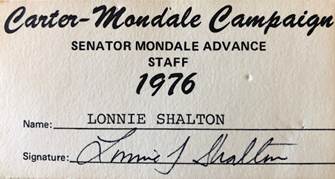
While out on the campaign trail in October, I got word about the infamous Playboy interview with Carter. The one where he said he looked on “with lust” at a lot of women and committed “adultery in my heart many times.” I of course immediately went out and bought a copy. For the article. Seriously.
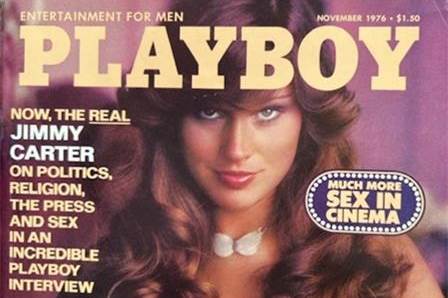
I still have the magazine in my Carter file, and when I picked it up, a newspaper page fell out. It was a full-page ad by the Ford campaign that ran in the Sioux City Journal.
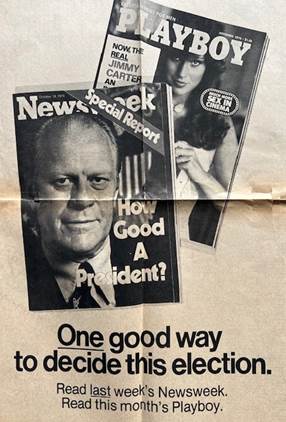
How quaint this looks today.
[Playboy Trivia: The Playmate in the Carter issue was Patti McGuire, a St. Louis woman who worked on Kit Bond’s governor campaigns in 1972 (he won) and 1976 (he lost). Her name sounded familiar, so I Googled. She moved on from Playmate of the Month in 1976 to Playmate of the Year in 1977. Two years later, she married a guy who previously had dated Chris Evert. Tennis star Jimmy Connors. Jimmy and Patti celebrated their 45th wedding anniversary this year. This is news you get only in Hot Stove.]
January 1977 – The Inaugural: A nice thank you for the advance work was an invite to the Inaugural and specifically to the Mondale staff party and the VP Inaugural Ball.
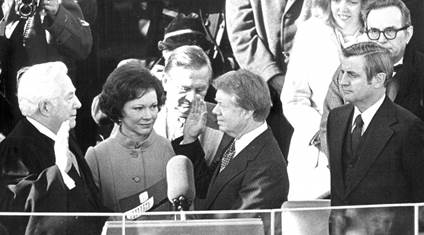
VP Advance Work: After the election, many from of the advance staff took DC jobs, several in the West Wing. Having no interest in leaving KC, I assumed my Carter/Mondale days were over. But then I got a call from the White House advance office asking if I would be available for occasional volunteer advance work. I happily signed on.
One of my first trips was to Chicago where there was infighting by factions of the party after Mayor Daley’s death. Carter had turned down the invite for the big annual dinner and offered up Mondale. I had to work with these factions who were not happy that they “only” got Mondale. One was quoted in the paper saying, “I just feel like I used to when I asked a woman for a date, and she turned me down.” Tough crowd.
Another memorable trip was to San Francisco where I worked on a big-time fundraiser with Bill Graham, one of the country’s biggest rock ‘n’ roll concert promoters. The guest list included the likes of Melvin Belli and Mayor George Moscone. Our local contact person for the event was Nancy Pelosi, a California member of the DNC, ten years away from being elected to Congress.
In 1978, I flew to Vegas to advance a Mondale rally for the Nevada midterms. I had not been there long when I got word the trip was off. Mondale was instead headed to join Carter and finalize the Camp David Accords. I wasn’t there but felt like I was at least history-making adjacent.
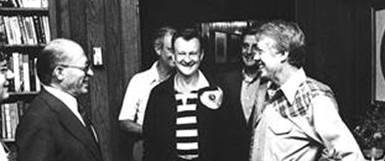
Now for the three trips that changed my life.
In 1978, I got a call to help advance a trip to Bangkok. I was 36 years old, had never been out of North America, and did not have a passport. I quickly got the passport and headed to Bangkok via Hong Kong. One of Mondale’s tasks on the trip was to support President Carter’s humanitarian efforts on behalf of refugees displaced by the war from Laos, Cambodia and Vietnam (the “boat people”). Below, the advance guy with Joan Mondale at the Grand Palace.
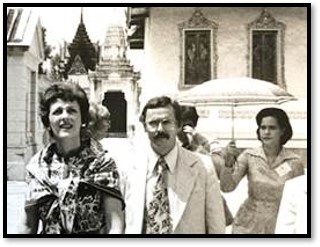
In 1979, the call was for Europe. Helsinki, mostly diplomatic stuff. I got a bonus. Rita had helped me on a Mondale trip in Topeka, and the staff recruited her for volunteer advance work. While I did Helsinki, Rita did Copenhagen. When we were done, we met in Paris. It was April.
In 1980, Africa. Lagos, Nigeria. A lot of economic talk (oil), and pressure from the Nigerian president about erasing racial inequality in South Africa. At the time, Nelson Mandela was in prison. Early in his administration, Carter called for ending apartheid, but progress was slow. Mandela was released from prison in 1990 and was elected president in 1994 when apartheid ended. In 2007, at the invitation of Mandela, Carter became a founding member of The Elders, a group of independent global leaders working together for peace, justice, human rights and a sustainable planet.
So how did this all change my life? After Bangkok, I continued on my own around the world – Kathmandu, Agra (Taj Mahal), Israel, Athens (Acropolis) and Cairo (Pyramids). At every stop, they had me at hello (in whatever language). I fell in love with international travel and never fail to credit Jimmy Carter and Walter Mondale for setting me on this journey. Rita and I married in 1981 and have since traveled to over 100 countries.
1979/1980: My tenure as chair of the County Committee ended in 1978. When Mike’s term of office ended in January of 1979, we both joined our law school classmate Jim Polsinelli at his law firm on the Plaza.
In those days, there were no cell phones, so no photos for many of the events described above. I finally got a photo with Carter in October of 1979 at the Jackson County Courthouse.
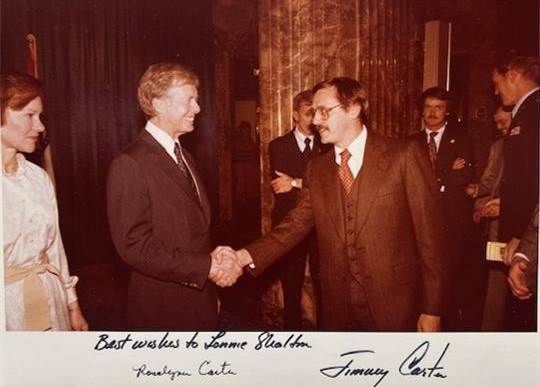
I did not advance in the 1980 reelection campaign. I was too busy at my new law firm.
The mix of high interest rates, Iran hostages and party dissension (Ted Kennedy) doomed the 1980 campaign. But as many historians are now pointing out, Carter had many lower profile successes on women’s rights, the environment, the Panama Canal, social justice, etc. that resonate today.
And of course, his extraordinary post-presidency is unmatched. I would need to double the size of this post to list Carter’s good deeds and do proper justice to capturing his decency and humanity.
Let’s boil it down to five words: HE’S THE BEST OF US!
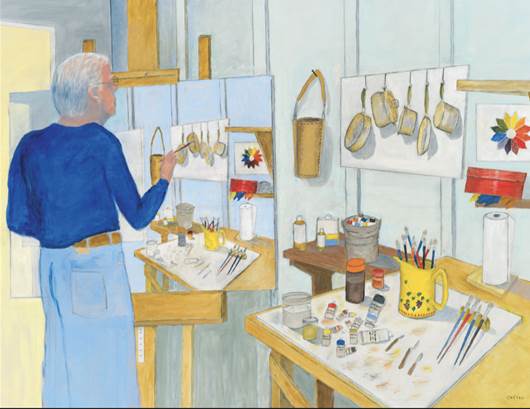
Jimmy Carter, My Studio, Self Portrait. As a Carter/Mondale alumnus, I remain on the mailing list for alumni news and the Carter Center. This also nets me a holiday card each year, and this 2023 card was cool.
Baseball Jimmy: Since this is a Hot Stove, I must include some baseball (and a Lonnie’s Jukebox below).
In 1974, Hank Aaron broke Babe Ruth’s home run record and received a personalized license plate from Georgia Governor Jimmy Carter.
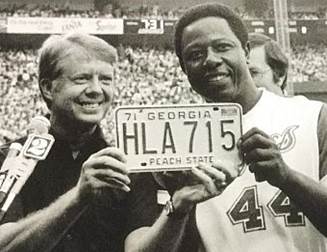
When Carter was campaigning in 1976, he famously loosened up his staff and visitors with softball games.
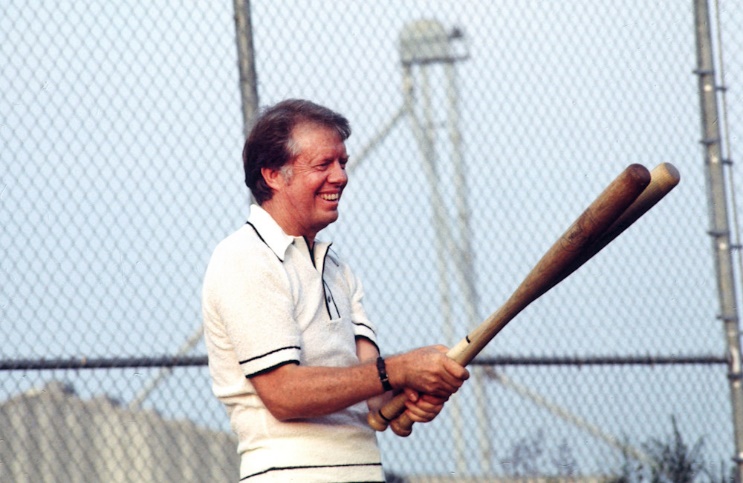
Jimmy and Rosalynn Carter were regulars at Atlanta Braves games for decades. Which of course got them on Kiss Cam (video here).
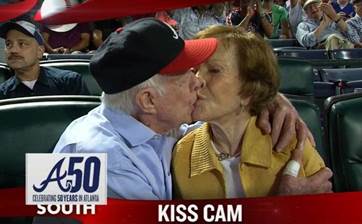
Below, Carter with George Brett at a stop in Kansas City during the 1980 reelection campaign. This is the year Brett hit .390 and led the Royals to their first World Series.
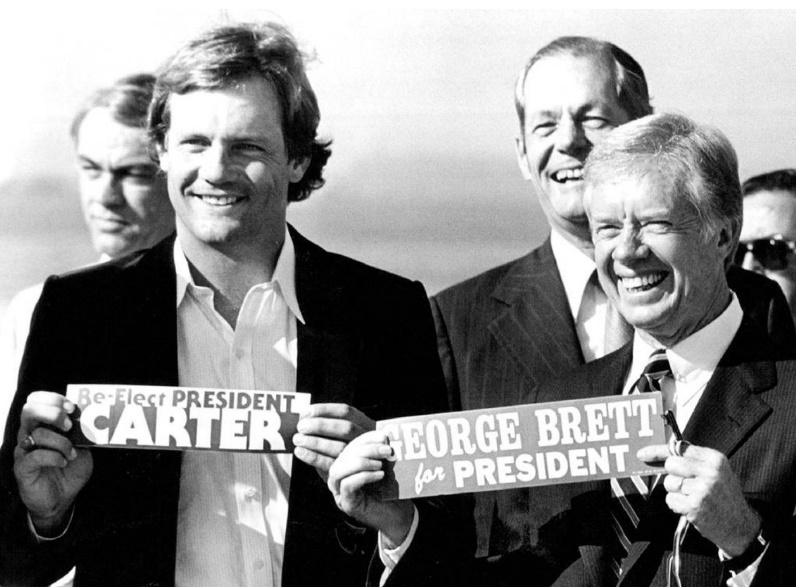
And joining former Presidents Clinton, W. Bush and Obama…
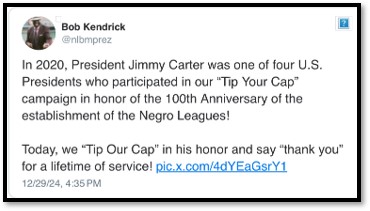
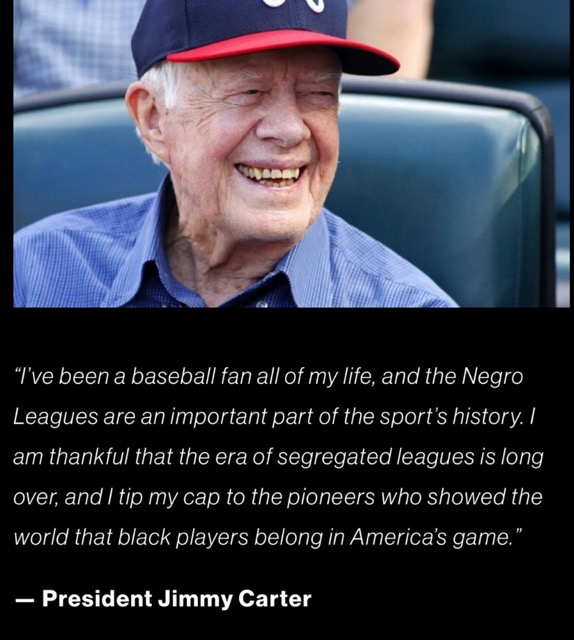
Lonnie’s Jukebox – Jimmy Carter: Rock and Roll President: When Carter campaigned in 1976, he received strong support from the music world. Carter was a true fan of many music genres – gospel, blues, jazz, folk and rock ‘n’ roll. Bob Dylan, Willie Nelson and members of the Allman Brothers Band had been to events at the governor’s mansion. Carter knew that the entertainers were much better known than he was, and so he asked them to perform at fundraisers to draw better crowds. Candidates in the past had done some of this (e.g., Frank Sinatra for Jack Kennedy), but Carter’s campaign took it to a new level that continues to this day.
And that is the subject of the 2020 movie Jimmy Carter: Rock and Roll President. Click here for the trailer. It is available on streaming services.
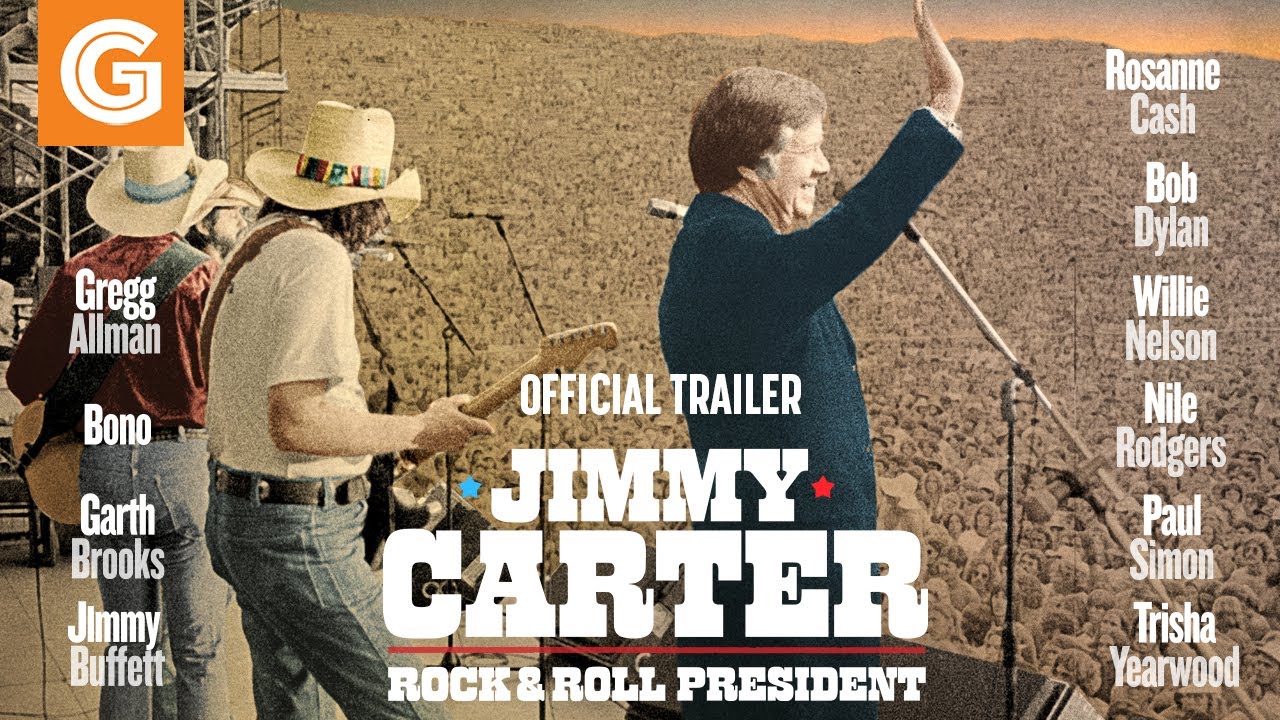
The post-Watergate election law provided matching federal funds for small donor contributions, and so tickets sold for events with the musicians had double value. Among those donating their services to Carter were the Allman Brothers Band, Willie Nelson, Jimmy Buffett, John Denver, the Marshall Tucker Band and the Charlie Daniels Band.
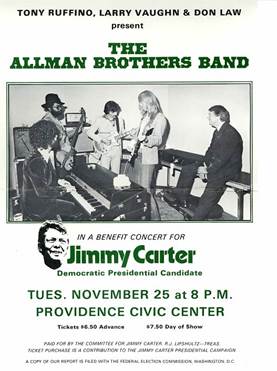
After Carter was elected, he held many events at the White House with entertainers from all genres. My favorite story is that Willie Nelson admitted to Carter that he had smoked pot at the White House with a staff member. Carter later found out that the “staff” person was one of Carter’s sons. Below, Willie in the Oval Office.
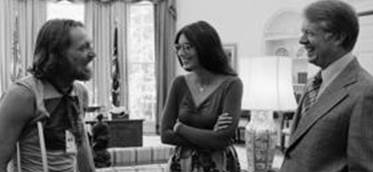
Now for some music from President Carter’s friends featured in the movie. Click on the song title to listen.
“Ramblin’ Man” by the Allman Brothers Band.
“The Devil Went Down to Georgia” by the Charlie Daniels Band.
“Mr. Tambourine Man” by Bob Dylan.
In the movie, there are two versions of “Georgia on My Mind.”
“Georgia on My Mind” by Ray Charles.
“Georgia On My Mind” by Willie Nelson. Willie sang this song at the ceremony for Carter’s 2002 Nobel Peace Prize.
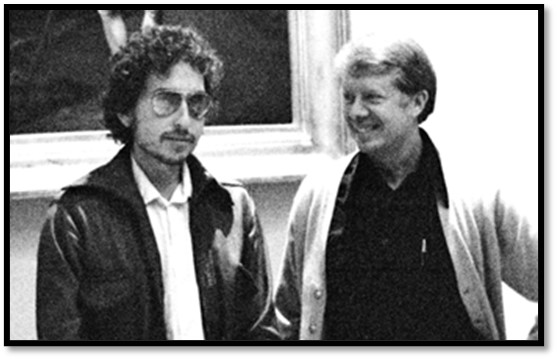
Above, Bob Dylan and Governor Carter in 1974. Carter learned to appreciate Dylan’s lyrics by listening to albums being played by his teenage children. On the night Carter won the 1976 Democratic nomination for the presidency, he borrowed a quote from Dylan’s “It’s Alright Ma”:
“I’ve never had more faith in America than I do today. We have an America that, in Bob Dylan’s phrase, is ‘Busy being born, not busy dying’.”
Still an appropriate goal for America.
RIP Mr. President.
